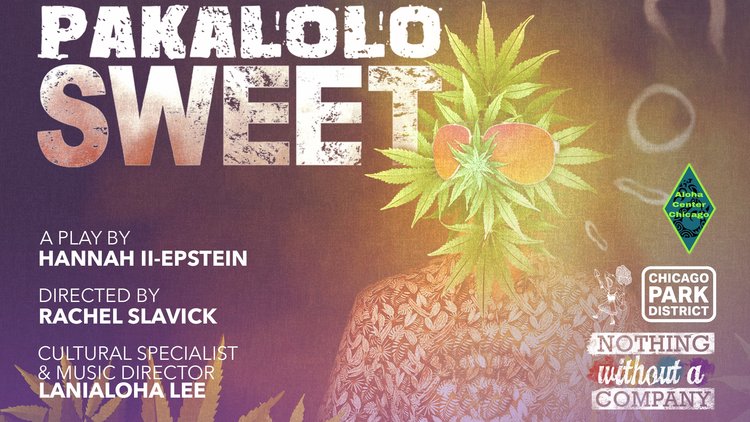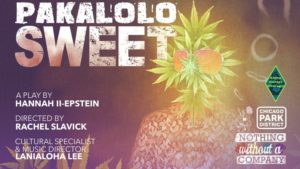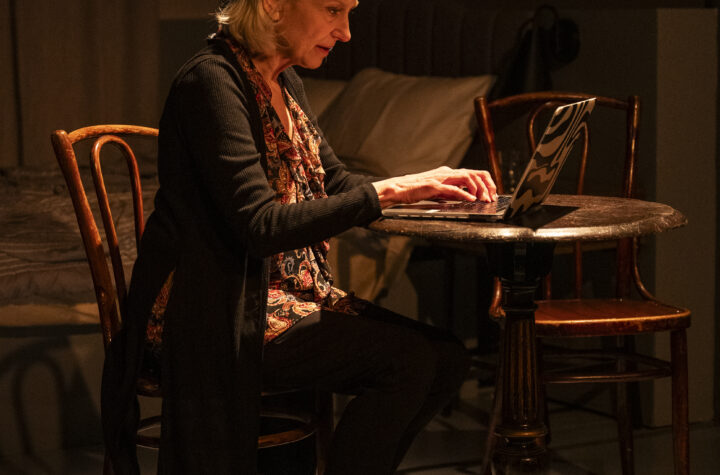
 Somewhat Recommended **Saturday night’s performance of “Pakalolo Sweet” at the Berger Park Cultural Center successfully transported the audience to a beachfront location in modern Hawaii. Chicago’s weather cooperated fully! The temperature outside was in the high 70s, a perfect Hawaiian evening. Inside the coach house of this former mansion, the beautifully-set interior, tastefully designed by Mark J. Bracken Jr., melded with the outdoors to reveal a view of Lake Michigan. The city by the lake now became the shores of an island, complete with serene ocean waves.
Somewhat Recommended **Saturday night’s performance of “Pakalolo Sweet” at the Berger Park Cultural Center successfully transported the audience to a beachfront location in modern Hawaii. Chicago’s weather cooperated fully! The temperature outside was in the high 70s, a perfect Hawaiian evening. Inside the coach house of this former mansion, the beautifully-set interior, tastefully designed by Mark J. Bracken Jr., melded with the outdoors to reveal a view of Lake Michigan. The city by the lake now became the shores of an island, complete with serene ocean waves.
The beginning starts as immersive theater, where the actors interact with audience members. This was mostly done via the medium of karaoke, and everybody was encouraged to sing along. Those interested could also play a game of cards or talk with the actors. This interactivity was to get the audience into the mood for the more traditional play to follow. Since we were encouraged to get up and move around during the first hour, I took maximum advantage. After singing a few karaoke songs, I suddenly noticed that a lot of things were vying for my attention outside of the show itself.
For starters, there was a huge red full harvest moon that had just risen over the ocean—I mean, Lake Michigan. People in the audience literally walked outdoors and those strolling along the lakefront stopped in their tracks to take photos. It was a spectacular sight!
Then, when the gender-neutral restroom door was propped wide open and didn’t exactly work out, I went inside the main building into the middle of a huge wedding reception, replete with food and music, where many of the guests had spilled outdoors. “Yet another party!” I thought to myself. Then as I was ready to go back inside the coach house to rejoin the audience, it was the playwright Hannah li-Epstein who stood at the door and said, “Have you seen the moon yet?” I told her I had seen it already but decided at that moment to walk back to the shoreline and look at it again. It was like watching a picture-perfect Hollywood production: the rising moon with its radiant light shimmering off the water.
Then there was the wayward hummingbird, which had accidentally found its way into the theater and kept flying throughout. Actors and audience members kept asking aloud, “Is it a bat?” “Is it a bird? “Is it a giant insect?” However, once the more traditional performance began, the bird was very well behaved and watched from a rafter.
The forty-minute icebreaker lasted much too long. A bit of that might have sufficed, and I did get into the party spirit (as did my guest, who was warmly thanked for his singing). In fact, the first part of the performance was much too disconnected from the second part when (according to the program) “you become a fly on the wall.” The transition, though, was good. Once the music shifts away from what one might sing at a karaoke bar and towards Hawaiian-themed music, the show gains focus.
The musical numbers are the best parts of the production. Dean Santiago (Junior Boy) has a phenomenal singing voice, a crooner who could easily be the headliner on cruise ships, plus he’s a terrific actor and a fine ukulele player. The musical number that represents the climax of the story is both poignant and delightful. Sharon Pasia plays the very pregnant Nani, who does a wonderful duet with Junior Boy—although it wasn’t clear if the two happened to be singing off-key during that particular performance or whether this was intentional. Either way, it was funny and worked well with the script. Special credit must be given to Lanialoha Lee, who has done a superb job in bringing Hawaiian cultural traditions to this production and imparting her knowledge of Pacific Island songs and dance. 
Now for the rest of the tale.
I have mixed feelings about a play that glorifies cannabis/marijuana use. In the Hawaiian language, pakalolo is slang for marijuana or weed: ‘paka’ means tobacco or smoke and ‘lolo’ means crazy or numbing. A portion of the script is devoted to an explanation of how pakalolo was once legal in Hawaii through the 19th century and discusses specific botanical strains of Hawaiian pakalolo. Papa aka Uncle Makana (Scott Handa) does a fantastic job telling us this story and explaining his relationship with (illegal) drugs during the Vietnam War. That said, whether weed today may or may not become legal in certain States frames the story, because all the male characters are in the marijuana distribution business and handle considerable amounts of money and inventory. This has become a trade, taught to Junior Boy by his father Pops (Jae K. Renfrow) and by Uncle Makana. The men apparently do not have the skills or interest to do much else but to follow in the family business. The women have been ground down by poverty. Nani works a double-shift in her job; Kahe (Victoria S. Wang) works as a tour guide and has an abusive boyfriend.
The larger theme is that making cannabis illegal has caused a huge underground economy to sprout up in Hawaii. The lure of making big bucks in a criminal activity has been far more disastrous than the use of the drug itself. This has had the unfortunate consequence of ruining many people’s lives and those of their families.
The actors do not use “real” or potent alcohol or cannabis on stage. These are replaced by smoking lots of CBD flower and drinking cans of O’Doul’s. You get the picture.
Much too much time is devoted to the actors acting as if they were stoned, wanting to be stoned, or stating how they preferred to be stoned. Their preoccupation with smoking weed makes the characters seem much too self-centered and unempathetic. It’s sad to watch people ruin their lives and waste whatever potential they might have to do something better for themselves or something uplifting for others.
Pakalolo is not so sweet. There is definitely trouble in paradise.
“Pakalolo Sweet” is directed by Rachel Slavick and produced by Nothing Without a Company in partnership with the Aloha Center Chicago. It is being presented at the Coach House, at the Berger Park Cultural Center, 6205 N. Sheridan Road, Chicago.
Performances are through Saturday, October 5, 2019, in accordance with the following schedule:
Monday through Friday at 7:30 p.m. and Saturday at 4:30 p.m. and 7:30 p.m.
General Admission tickets are $30 online and $35 at the door. For online ticketing, go to NothingWithoutaCompany.org.
Nothing Without a Company offers half-price student and industry discounts upon request. Send requests to boxoffice@nothingwithoutacompany.org.
The program insert contains a Content Warning. Among other things, it states: “This production contains gun shot, strong language, drug use, suicide, physical and verbal abuse, moments of darkness, and mentions of rape.”
To see what others are saying, visit www.theatreinchicago.com, go to Review Round-Up and click at “Pakalolo Sweet”.






More Stories
“No Such Thing”
“Dead Man’s Cell Phone”
“the distrikt of lake michigun”